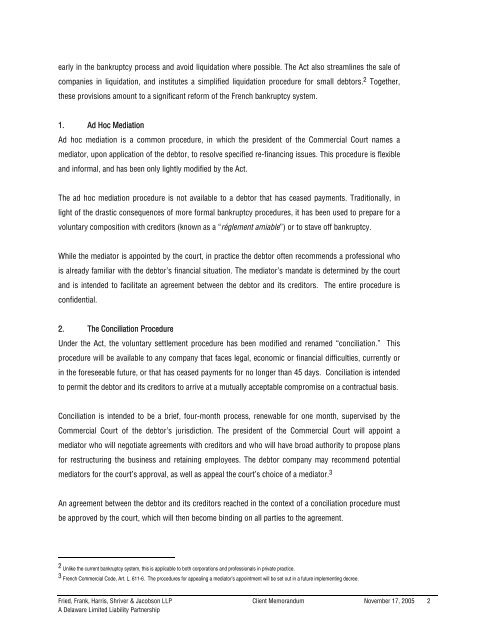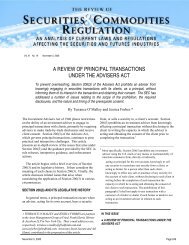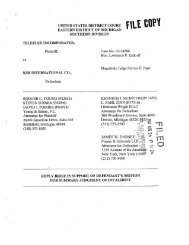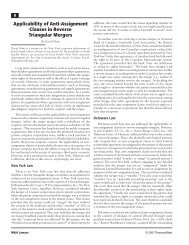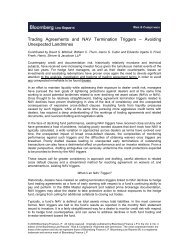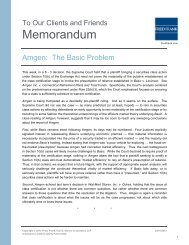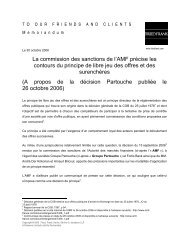Reform of French Bankruptcy Law - Fried Frank
Reform of French Bankruptcy Law - Fried Frank
Reform of French Bankruptcy Law - Fried Frank
Create successful ePaper yourself
Turn your PDF publications into a flip-book with our unique Google optimized e-Paper software.
early in the bankruptcy process and avoid liquidation where possible. The Act also streamlines the sale <strong>of</strong><br />
companies in liquidation, and institutes a simplified liquidation procedure for small debtors. 2 Together,<br />
these provisions amount to a significant reform <strong>of</strong> the <strong>French</strong> bankruptcy system.<br />
1. Ad Hoc Mediation<br />
Ad hoc mediation is a common procedure, in which the president <strong>of</strong> the Commercial Court names a<br />
mediator, upon application <strong>of</strong> the debtor, to resolve specified re-financing issues. This procedure is flexible<br />
and informal, and has been only lightly modified by the Act.<br />
The ad hoc mediation procedure is not available to a debtor that has ceased payments. Traditionally, in<br />
light <strong>of</strong> the drastic consequences <strong>of</strong> more formal bankruptcy procedures, it has been used to prepare for a<br />
voluntary composition with creditors (known as a “réglement amiable”) or to stave <strong>of</strong>f bankruptcy.<br />
While the mediator is appointed by the court, in practice the debtor <strong>of</strong>ten recommends a pr<strong>of</strong>essional who<br />
is already familiar with the debtor’s financial situation. The mediator’s mandate is determined by the court<br />
and is intended to facilitate an agreement between the debtor and its creditors. The entire procedure is<br />
confidential.<br />
2. The Conciliation Procedure<br />
Under the Act, the voluntary settlement procedure has been modified and renamed “conciliation.” This<br />
procedure will be available to any company that faces legal, economic or financial difficulties, currently or<br />
in the foreseeable future, or that has ceased payments for no longer than 45 days. Conciliation is intended<br />
to permit the debtor and its creditors to arrive at a mutually acceptable compromise on a contractual basis.<br />
Conciliation is intended to be a brief, four-month process, renewable for one month, supervised by the<br />
Commercial Court <strong>of</strong> the debtor’s jurisdiction. The president <strong>of</strong> the Commercial Court will appoint a<br />
mediator who will negotiate agreements with creditors and who will have broad authority to propose plans<br />
for restructuring the business and retaining employees. The debtor company may recommend potential<br />
mediators for the court’s approval, as well as appeal the court’s choice <strong>of</strong> a mediator. 3<br />
An agreement between the debtor and its creditors reached in the context <strong>of</strong> a conciliation procedure must<br />
be approved by the court, which will then become binding on all parties to the agreement.<br />
2 Unlike the current bankruptcy system, this is applicable to both corporations and pr<strong>of</strong>essionals in private practice.<br />
3 <strong>French</strong> Commercial Code, Art. L. 611-6. The procedures for appealing a mediator’s appointment will be set out in a future implementing decree.<br />
<strong>Fried</strong>, <strong>Frank</strong>, Harris, Shriver & Jacobson LLP Client Memorandum November 17, 2005 2<br />
A Delaware Limited Liability Partnership


